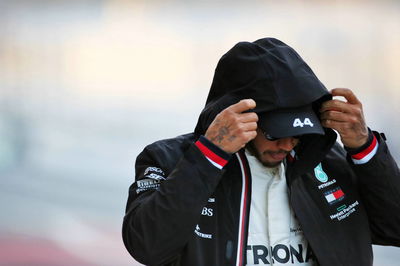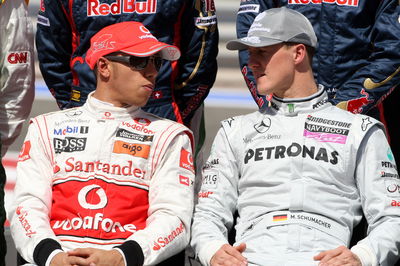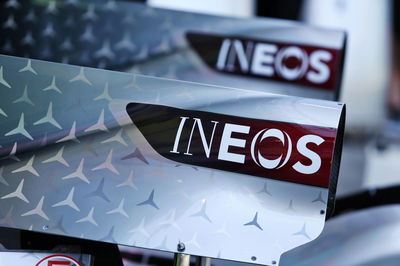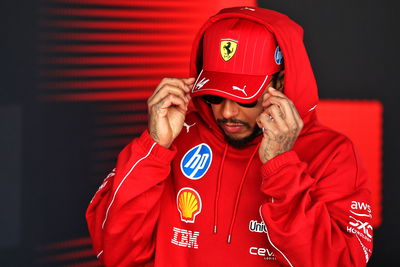How coronavirus could hurt Hamilton’s F1 record hopes
Assuming the 2020 Formula 1 season is not cancelled altogether and some racing does take place, it will impact on the championship records that were set to fall.
The ongoing coronavirus pandemic has already resulted in eight races being postponed or cancelled, with the start date target constantly being pushed back by F1 officials as they rush to organise as many rounds as possible.

Assuming the 2020 Formula 1 season is not cancelled altogether and some racing does take place, it will impact on the championship records that were set to fall.
The ongoing coronavirus pandemic has already resulted in eight races being postponed or cancelled, with the start date target constantly being pushed back by F1 officials as they rush to organise as many rounds as possible.
F1’s 10 teams have already agreed to postpone the planned 2021 technical rules overhaul in a bid to save costs, while the traditional summer break has been moved into a three-week spring slot between March and April to free up the month of August for some of the affected races to be rescheduled.
Eight races are believed to be the minimum requirement needed to constitute a world championship season but, understandably, F1 and the teams will want more given the financial strings attached to each round and the lucrative broadcast and sponsorship deals in place. Each race that is lost acts a crucial blow.
F1 is continuously facing fresh setbacks as the spread of coronavirus continues to accelerate on a worldwide scale, forcing most of Europe to take drastic and strict travel and social distancing measures - and even in some extreme cases such as Italy, France, Spain and the United Kingdom - impose nationwide lockdowns.
As such, plans to begin the season in May were originally knocked back until June 7, before the Azerbaijan Grand Prix became the latest race to be postponed on Monday, pushing the start date back even further. The first race that has yet to be called off is the Canadian Grand Prix on June 14, though that is also expected to fall in the coming days.
“We recognise there is significant potential for additional postponements in currently scheduled events, none the less we and our partners fully expect the season to start at some point this summer, with a revised calendar of between 15-18 races,” said F1 CEO Chase Carey in the latest statement issued on Monday evening.
For the driver heading into the season in the form of his life and tipped as the clear title favourite, the delayed start and possible further disruption is a particular negative.
Lewis Hamilton hoped 2020 would be the year that saw him achieve an unprecedented claim, becoming the first driver ever to move level with Michael Schumacher on seven world championships titles.
While there is every chance that feat could still happen if the season does eventually start, a limited amount of races would provide an entirely new challenge.
Hamilton has a number of Schumacher’s records in his sights, including the outright number of grand prix victories. The 35-year-old needs just seven more wins to draw level with Schumacher’s tally of 91 and eight to move clear.
Naturally, in a world championship that consists of just 15, 10 or even fewer races, that would become an increasingly more difficult moving target to achieve, as would potentially the championship title itself, especially given the expected challenge coming from the likes of Ferrari and Red Bull.
Assuming Hamilton prevails either way, then he would match Schumacher in terms of titles but may have to wait until 2021 to eclipse his other records including race wins.

There are smaller, less essential records Hamilton could miss out on too. He can no longer claim most pole positions at the same grand prix after the Australian Grand Prix was cancelled. Hamilton already holds eight poles at Melbourne and a ninth this year would have been an outright record. Assuming the Canadian or Hungarian grands prix go ahead, Hamilton will have the opportunity to match Schumacher’s achievement of eight victories at the same race.
Hamilton has repeatedly insisted that he is not allowing himself to think about matching - or even surpassing - Schumacher’s record, but deep down he knows the importance of what he is on the verge of achieving and the legacy that will leave on the sport.
“It’s beyond surreal to think that this journey, my life journey, has brought me to this point and winning the sixth title,” Hamilton said after winning his last title at the 2019 United States Grand Prix.
“I definitely had thought that getting anywhere near Michael was just so far-fetched and I remember having my one [championship] for a long period of time then getting that second one [in 2014]. It was so far away and now it [seven championships] seems so close yet so far away that I still can’t comprehend.”
Hamilton has already proven he can overcome almost any scenario thrown his way, but conquering the new concept of a short world championship, or one that features many races - and possibly double-header events - crammed into a short window of time, might strengthen the argument for Hamilton to be classed as the greatest of all time.
While Hamilton is likely to go on to match and possibly beat Schumacher in the future, the coronavirus outbreak might just prove to be the factor that stops him in 2020 and keeps Schumacher’s records preserved for another year at least.












